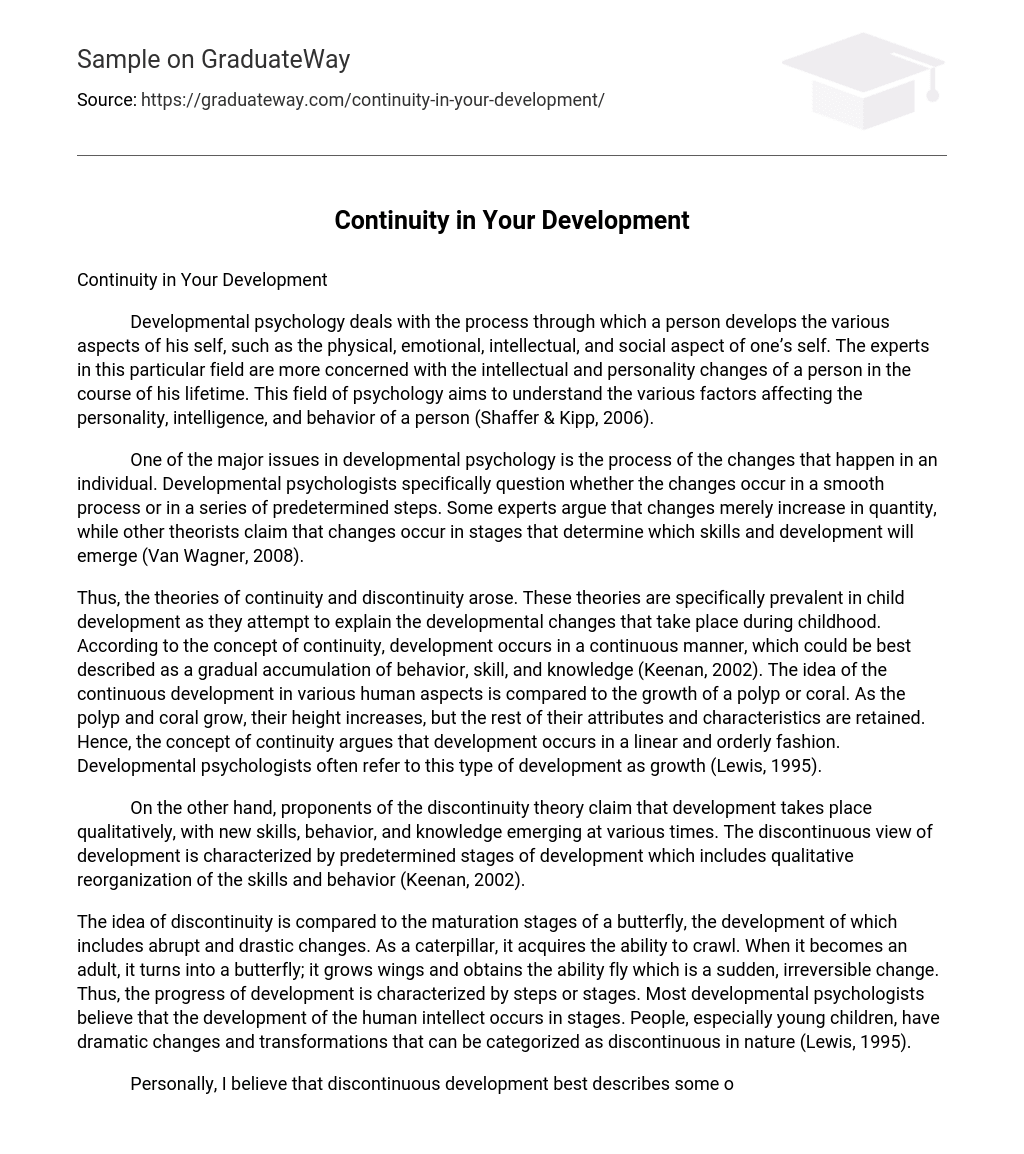Developmental psychology deals with the process through which a person develops the various aspects of his self, such as the physical, emotional, intellectual, and social aspect of one’s self. The experts in this particular field are more concerned with the intellectual and personality changes of a person in the course of his lifetime. This field of psychology aims to understand the various factors affecting the personality, intelligence, and behavior of a person (Shaffer & Kipp, 2006).
One of the major issues in developmental psychology is the process of the changes that happen in an individual. Developmental psychologists specifically question whether the changes occur in a smooth process or in a series of predetermined steps. Some experts argue that changes merely increase in quantity, while other theorists claim that changes occur in stages that determine which skills and development will emerge (Van Wagner, 2008).
Thus, the theories of continuity and discontinuity arose. These theories are specifically prevalent in child development as they attempt to explain the developmental changes that take place during childhood. According to the concept of continuity, development occurs in a continuous manner, which could be best described as a gradual accumulation of behavior, skill, and knowledge (Keenan, 2002). The idea of the continuous development in various human aspects is compared to the growth of a polyp or coral. As the polyp and coral grow, their height increases, but the rest of their attributes and characteristics are retained. Hence, the concept of continuity argues that development occurs in a linear and orderly fashion. Developmental psychologists often refer to this type of development as growth (Lewis, 1995).
On the other hand, proponents of the discontinuity theory claim that development takes place qualitatively, with new skills, behavior, and knowledge emerging at various times. The discontinuous view of development is characterized by predetermined stages of development which includes qualitative reorganization of the skills and behavior (Keenan, 2002).
The idea of discontinuity is compared to the maturation stages of a butterfly, the development of which includes abrupt and drastic changes. As a caterpillar, it acquires the ability to crawl. When it becomes an adult, it turns into a butterfly; it grows wings and obtains the ability fly which is a sudden, irreversible change. Thus, the progress of development is characterized by steps or stages. Most developmental psychologists believe that the development of the human intellect occurs in stages. People, especially young children, have dramatic changes and transformations that can be categorized as discontinuous in nature (Lewis, 1995).
Personally, I believe that discontinuous development best describes some of life’s experiences. Some of our abilities change qualitatively, and the changes occur in steps and stages. The acquisition of knowledge and skills and changes in behavior are characterized by discontinuous change or development, as we exhibit behavior and possess knowledge and skills that match our age.
To cite an example, as a child, I learned how to read and solve simple mathematical equations when I was in primary school. As I grew older, the quantity and quality of knowledge and skills that I learned gradually became more complex. Thus, the knowledge and skills that we acquire gradually evolves from basic to more complex as we grow older.
As developmental psychologists explained, all areas of intellectual function are somehow interrelated. As we grow, we get familiar with and enjoy things that fit our cognitive abilities. We observe that in childhood, we enjoy games of color coordination and shapes. As we grow, we enjoy more complex games which involve rules and require greater intellectual skills and understanding, such as board games and computer games.
References
Keenan, T. (2002). An Introduction to Child Development. London: Sage Publications.
Lewis, C. (1995). Aspects of Human Development. Malden, Massachusetts: Blackwell Publishers.
Shaffer, D. & Kipp, K. (2006). Developmental Psychology: Childhood and Adolescence. Belmont, CA: Wadsworth/Thomson.
Van Wagner, K. (2008). Issues in Developmental Psychology. About.com. Retrieved September 4, 2008 from http://psychology.about.com/od/developmentalpsychology/a/devissues.htm.





